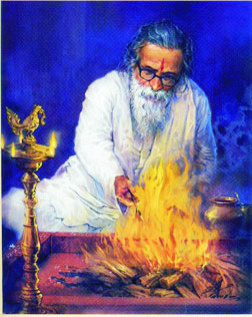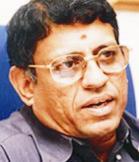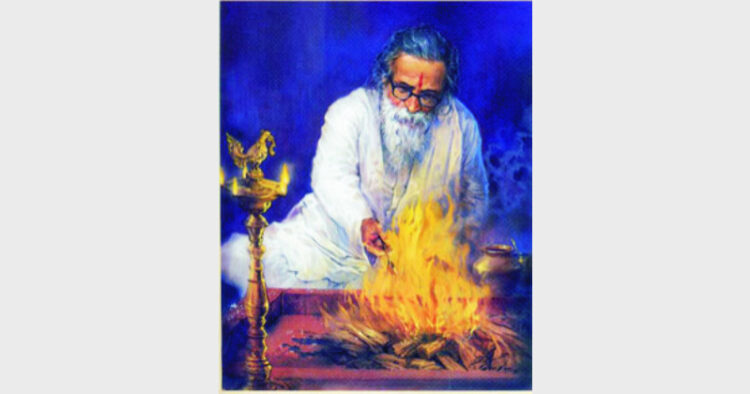
Guruji: A drishta not a Prophet—IV
S Gurumurthy
 The previous part had given trailer-like bullet points of the ensuing detailed exposition on how Shri Guruji’s thoughts stand vindicated by the history that unfolded after him. This series attempts to uncover that hidden dimension of Guruji’s thoughts which, thanks to the biased scholarship on RSS, remains unravelled even decades after his life. This series distinguishes between (a) Guruji’s textual thoughts unbound to, and not limited by, their context and (b) Guruji’s contextual thoughts, bound by and limited to a context. A general view of how texts and contexts relate and unrelate is relevant as a small prologue to the upcoming series.
The previous part had given trailer-like bullet points of the ensuing detailed exposition on how Shri Guruji’s thoughts stand vindicated by the history that unfolded after him. This series attempts to uncover that hidden dimension of Guruji’s thoughts which, thanks to the biased scholarship on RSS, remains unravelled even decades after his life. This series distinguishes between (a) Guruji’s textual thoughts unbound to, and not limited by, their context and (b) Guruji’s contextual thoughts, bound by and limited to a context. A general view of how texts and contexts relate and unrelate is relevant as a small prologue to the upcoming series.
Space and time (desa-kala) converge as context of a text. Where (space) and when (time) a text originated merge in to its context. Normally, a text is relevant for the time and space convergence of which generated it. Texts and contexts broadly relate or unrelate thus. One, texts linked to and limited to a context. Two, texts linked but not limited to a context. Three, texts without a context. Four, texts beyond context. The first category constitutes contextual texts whose relevance ceases with their context. The second and fourth categories transcend context – they have no context, or vault over it or defy its compulsions, or whose validity is discovered after their context. They are textual. Their relevance is not limited to their context. The third category is deliberate separation of a text from its context and quoting the text, without, or out of, context, to distort and pervert the text and discourse.
Text linked to, and limited to, context
The normal rule is that, no text originates, or exists, in a vacuum. A text cannot be swayambhu. It cannot arise without context. A text is related to its context. The context explains the text. To understand a text better, it needs to be placed in a specific context. In contrast, a text divorced from its context invariably misleads. The prevailing historical, social, political and cultural setting that influences the author from the background to a text constitute the time-space elements of the context. Most of the texts fall in contextual category. For example, much of the texts generated in a bitter context, like the Partition of India, would be contextual. The relevance of such texts are limited to, or exhausted by, their context. History records them, yes. But, it discards them too after their context is over. The future erodes their contextual value.
Text linked to, but not limited to, context
But the relevance of some texts bound to context may extend beyond context. The text of Bhagwat Gita, for example, is of that kind. The Mahabharata generally, and the Kurukshetra specifically, constitute its context. The Gita is more intelligible in the context of the Mahabharata and the Kurukshetra war in which it was rendered. The Mahabharata-Kurukshetra context makes the text of Gita more understandable, but does not limit the relevance of Gita to the context only. The Gita’s relevance transcends beyond the Kurukshetra war or its time. The Gita is a great example of a text bound to a context, but not limited to it in relevance. Since its relevance transcends the context, Gita is textual, not contextual.
Text without context or out of context
But competitive demagogy has produced slanderous debates that deliberately quotes texts, without or out of context, to score debating points. This aids contemporaneously influential establishments, by their power and reach, to pass off untruth as the truth, by quoting a text out of or without context. This puts the victim of slander, lacking in similar reach, on the defensive. Quoting a text out of context orphans the text, robs its meaning, even distorts or perverts it. The digital media facilitates it even more. It accustoms readers to read just the headlines, not beyond. On the impact of digital communication sans the context and recognising how a text set in its context is more meaningful. An article “Text without Context” in New York Times (March 17, 2010) says that (digital) texts read without context mislead. The article says: “Instead of reading an entire news article, watching an entire television show or listening to an entire speech, growing numbers of people are happy to jump to the summary, the video clip, the sound bite — never mind if context and nuance are lost in the process…….” Digital media makes slanderous scholarship based on quoting, without, or out of, context, easier. Citing a text as a continuing thought after its context is over also amounts to quoting it without, or out of, context.
Text beyond context
The texts beyond contexts are unbound by time and space. Timeless texts like the Vedas and Upanisadas constitute texts without contexts. The texts that expound ‘Sanatana Dharma’ (timeless values) fall in this category. Such texts constitute eternal truths. The thoughts inhering in timeless texts, being beyond contexts, survive all contemporary differences and remain valid regardless of different and passing contexts. Any text or thought that expound such timeless values are also texts beyond contexts.
“We Or Our Nationhood Defined” – a contextual text, also quoted without and out of context
As part of the prologue to the series, a slanderous scholarship that has been going on against Guruji for decades, which thrives on quoting him without, and out of, context, needs to be shown its true worth. Contemptuously ignoring the basic rule that a text quoted, without, or out of, context, misleads, distorts and perverts the text, a body of malicious literature has been generated against the RSS by quoting Guruji, without, and out of, context, from a booklet titled “We Or Our Nationhood Defined”. (“We”) credited to Guruji in 1939. It was written before 1940 when Guruji became the Sarsanghachalak of the RSS. In that booklet, as Ainslee T Embree, the Fundamentalism Project scholar on RSS observes (Vol 1 p566), “writing well before the full horror of Nazi persecution would become known”, Guruji, felt “impressed” by Adolf Hitler [ibid]. In that text, Guruji, asserting the superiority of Hindu race, had rather aggressively suggested that either non-Hindus accept Hindu values or lead a subordinate existence. A highly belligerent stance indeed. But now, see the global and national context of this text.
Many great men and women of the world had looked at Hitler with awe at that time. The list of Hitler’s admirers that then included great intellectuals, artistes, professionals and statesmen would shock anyone to day. Mahatma Gandhi, an icon of non-violence, wrote to Hitler in 1941 – two years after Guruji viewed Hitler positively – telling him “Nor do I believe that you are the monster described by your opponents.” Gandhi said later, “Hitler killed 5 million Jews…But the Jews should have offered themselves to the butcher’s knife….. thrown themselves into the sea from cliffs.” (Gandhi Under Cross-Examination (Paperback) by GB Singh and Dr Tim Watson Ref: http://www.wnd.com/2008/05/63906/).
A towering nationalist, Subhash Chandra Bose, looked to Hitler for inspiration (Hitler and his God, by Georges Van Vrekhem, Rupa & co [2006] p656/57), Joseph Stalin had admired Hitler. Bernard Shaw too. Henry Ford, admiring Hitler, used to send him a birthday gift of DM 50000 – now equal to $3.5 million or Rs 19.6 crore – each year! “One may dislike Hitler’s system and yet admire his patriotic achievement. If our country were defeated, I hope we should find a champion as indomitable to restore our courage and lead us back to our place among the nations.” Who says this? Winston Churchill, who led the British against Hitler later. Churchill also said: “We cannot tell whether Hitler ….. will go down in history as the man who restored honor and peace of mind to the Great German nation”. Obviously, many, including Guruji, who saw Hitler in favourable light, never knew him as a mass killer. Why then single out Guruji, dishonestly, for being positive on Hitler, like others were, in a context?
Also the text “We” was written in the context of rising Islamic politics with Muslim separatism threatening Greater India – Akhand Bharat. It eventually divided the Greater India into India and Pakistan. The divisive Muslim politics had become bitterly aggressive with the Aligarh movement taking shape and a separate civil law for Muslims enacted by the British in 1938. The text “We” was a bitter response in that bitter context. The RSS itself has officially stated that “a baffled and evasive domestic and international politics certainly influenced the contents of the book”, implying that the text being context-bound, its relevance would not last beyond its bitter context. The RSS has also said that what it contained was never its or Guruji’s view, adding that Guruji himself had clarified that it was an abridged [English] version of GD Savarkar’s Marathi text Rashtra Meemamsa. The slanderers have not even fine printed these vital remarks.
More. Guruji’s journey as exponent of the RSS ideology commenced only after June 1940 when he became the Sarsanghachalak of RSS. It continued for 33 years till his end in June 1973. As the RSS has justifiably contended, the slanderers could not cite any statement supportive of the text “We” in Guruji’s exposition of the RSS ideology during the three decades as the chief of the RSS. Guruji was extraordinarily profuse, yet consistent, in his decades long exposition on the inclusive Hindu cultural nationalism that integrated all Bharatiyas, Muslims included. Yet, the slanderers deliberately had suppressed, and continue to suppress, the consistent, context-unbound textual views of Guruji. They maliciously recall, without, and out of, context, his context-bound “We”, knowing that its relevance was limited to the context in which it was rendered. If, like in Guruji’s case, context is ignored, Gandhi, Churchill, Bose and others have to be interrogated more aggressively on their texts on Hitler. The campaign citing Guruji’s context-bound remarks is, therefore, unfair at best and dishonest at worst. Consequently, recalling, without and out of context, the context-bound references in “We” ought to be condemned in the interest of fair debate on Guruji.
Now on to the theme – how Guruji’s thoughts transcended time-space contexts and contemporary compulsions and proved him right, though after him.
(The writer can be contacted at [email protected])














Comments